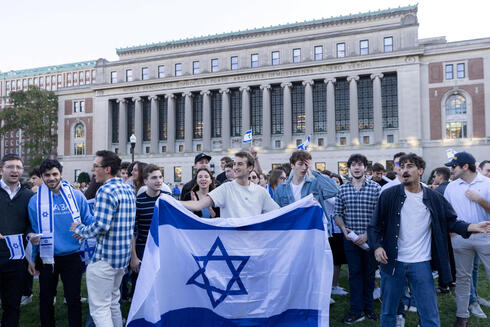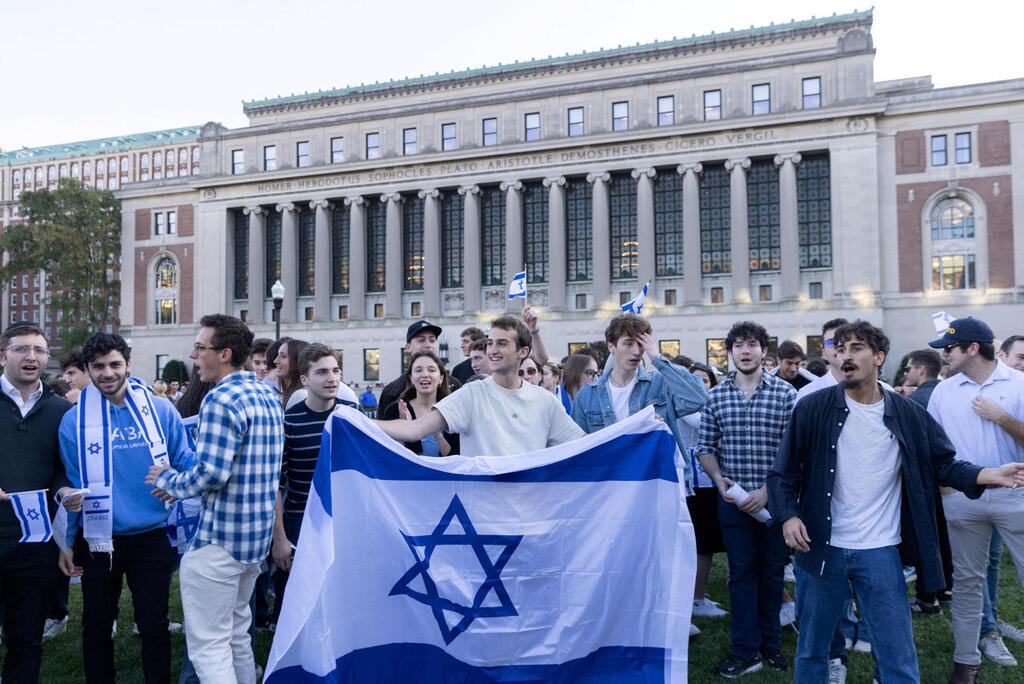
ISRAEL AT WAR
US campuses become battleground in Israel-Hamas public opinion war
Since the Hamas terror attack on Israel last week, Harvard, Columbia and NYU have been in turmoil. At New York’s Columbia University there were demonstrations both for and against Israel. Harvard came under fire for its silence in the face of a statements by student groups that Israel was responsible for the massacre
Since the beginning of the war, leading universities in the United States have transformed into stormy scenes of controversy surrounding Hamas' massacre of Israelis. Campuses throughout the country were split in two - one side standing in solidarity with Israel and the other side spreading over a wide spectrum of reactions, starting with a show of solidarity towards the residents of Gaza and continuing to celebrations praising the Hamas attack as a legitimate act of resistance to the occupation.
At Columbia University in New York City, two support rallies were held at the same time last Thursday. One was "Students for Israel," and the other, "Students for Justice for Palestine." The rallies, although they passed in relative silence, created such a charged atmosphere on the campus that the university administration decided to prevent entry to its campus to those not holding a valid university ID card. This restriction was imposed after university management identified "significant efforts" to recruit outside protesters in a manner that could create an unsafe environment.
Many of the participants of the demonstration for Palestine tried to hide their identity and wore masks. They even accused the university administration of failing to create a safe space for them. But the risks facing pro-Palestinian demonstrators do not only concern their physical safety, but also long-term professional consequences.
Thus, on the eve of the demonstration, a prestigious job offer was canceled for Rayna Workman, a law student at New York University (NYU), after she published that "Israel bears full responsibility for this loss of life" in the newsletter of the law school's bar association, a group she heads. The letter provoked such a widespread outburst of criticism that the law firm Winston & Strawn, which hired Workman, withdrew its offer. In a statement, the firm said the former summer associate’s comments “profoundly conflict with Winston & Strawn’s values as a firm.”
The culmination of the controversy and conflicts that broke out in the various universities occurred in the oldest and most prestigious university, Harvard. There, 31 student organizations published a statement at the beginning of last week according to which they consider Israel "fully responsible" for the mass slaughter by Hamas.
Harvard’s administration remained silent, leading to public criticism directed at key figures. For example, venture capital investor and university graduate Bill Ackman tweeted that several CEOs are interested in knowing the identity of the signatories so that they do not inadvertently hire those students.
At the same time, senior economist Larry Summers, who served as Treasury Secretary under President Bill Clinton and chairman of the National Economic Council under President Barack Obama, condemned the silence of Harvard, where he served as president from 2001-2006.
Not long after, the couple Idan and Batia Ofer announced that they had quit a Harvard executive board following the university's response to the war and announced the withdrawal of a donation that was supposed to be transferred to the academic institution.
At least nine groups have since withdrawn their signatures on the letter, with some claiming that they had not seen its contents prior to publication. Other sources claimed that they had fallen victim to doxxing. At the same time, several websites published the personal information of the students belonging to the groups that signed the letter, including their names, their place of work, their profiles on social networks and their place of birth. Since the middle of last week, a truck has been patrolling the campuses of Harvard with digital billboards, on which are displayed the names and faces of the students who were identified with the groups that signed the letter.
In the wake of the storm, Harvard President Claudine Gay issued an official condemnation, but rejected calls to punish and reveal the identity of the students who signed the letter. At the same time, she emphasized that Harvard adheres to its commitment to freedom of expression and will not seek to impose sanctions on those who have expressed criticism of Israel.
Against the background of the intensification of fighting in Gaza and the daily jump in the number of civilian casualties, the turmoil in the world of academia is only expected to escalate and Israel's public credit will run out. Universities are indeed working to increase security, but at the same time there are increasing reports of pro-Israeli or Jewish students who suffer harassment, and pro-Palestinian students who suffer from doxing and fear for their professional future. This is a reality with limited possibilities to recognize two streams of information that exist at the same time: one that reveals the unimaginable cruelty of Hamas in the Israeli border settlements and the grave concerns for the fate of the abductees, and alongside that, reports of the heavy bombing in Gaza and the displacement of hundreds of thousands of residents from their homes.














